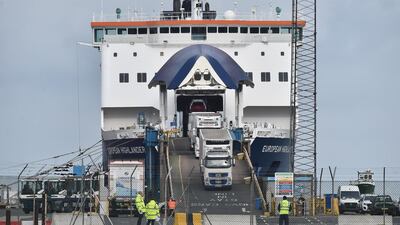The European Union launched legal action against the UK in a major escalation of Brexit tension.
At the heart of the row is Britain’s decision to delay implementing a key part of its withdrawal agreement with the EU relating to Northern Ireland.
The bloc sent a formal notice of an "infringement procedure", which could lead to fines being imposed by the EU's top court.
Maros Sefcovic, the EU official in charge of UK relations, said the British decision "undermined trust" in the wake of the withdrawal agreement.
"The EU and the UK agreed the protocol together. We are also bound to implement it together," he said.
"Unilateral decisions and international law violations by the UK defeat its very purpose and undermine trust between us. The UK must properly implement the protocol if we are to achieve our objectives."
Mr Sefcovic sent a separate "political" letter to his British counterpart David Frost, calling for a "mutually agreed solution".
"I do hope that through the collaborative, pragmatic and constructive spirit that has prevailed in our work so far on implementing the withdrawal agreement, we can solve these issues in the joint committee without recourse to further legal means," he said.
The UK has one month to reply to the letter before legal proceedings begin.
Shortly before the announcement, UK Prime Minister Boris Johnson's spokesman said the government would respond to the EU's letter once it was received.
On March 3, the UK government announced it would unilaterally extend the grace period from April until October 1 for checks on goods entering Northern Ireland.
Under the Brexit deal, Northern Ireland remains part of the bloc’s single market for produce arriving from mainland Britain, with goods required to undergo EU import procedures. Extending the grace period would exempt goods, such as food, medicine and plants, from border checks.
The arrangement avoided the need for a hard border on the island of Ireland, a measure that could jeopardise the peace process under the 1998 Good Friday Agreement.
UK ministers said the six-month delay was a “limited and technical” arrangement and said it was necessary "to provide more time for businesses, such as supermarkets and parcel operators, to adapt to and implement the new requirements”.
Prime Minister Boris Johnson said the move was very sensible. Businesses in Northern Ireland also supported the decision.
The EU's executive European Commission promised to respond with the legal means established by the Brexit divorce deal and the trade agreement to what it said was Britain's second threat to breach international law.
Britain maintains it has not breached the Northern Ireland protocol.
Last September, Britain acknowledged its Internal Market Bill would break international law by breaching parts of the Withdrawal Agreement treaty it signed in January 2020, when it formally left the EU. However, it dropped certain contentious clauses in December, two weeks before the two sides struck a trade deal.

